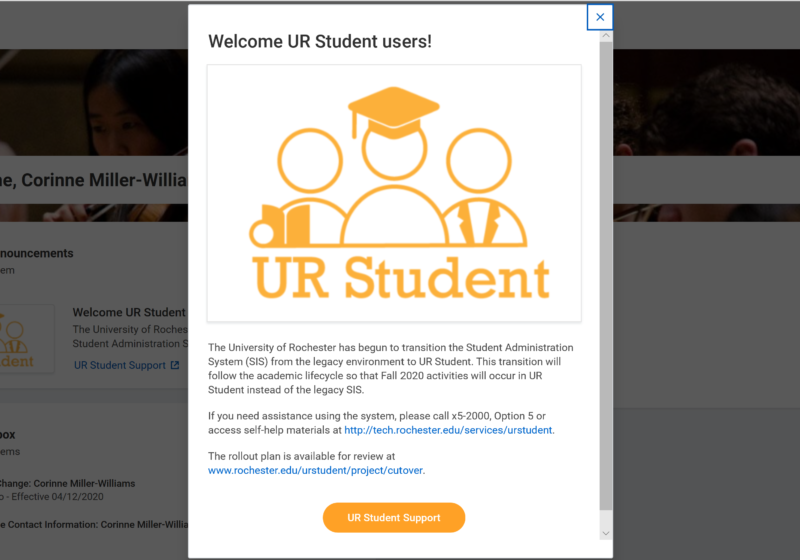UR Student, the University’s new system for class registration, student finance, and student record-keeping, has been rolled out to all students at the University.
According to sophomore Ian Krager, head of the Academic Affairs Committee which has been assisting with the implementation of UR Student, the system replaces the Integrated Student Information System which is being phased out as the University’s primary student records system.
Student records have already been entered into UR Student, Krager said, and students registering for classes beginning April 20 will do so on UR Student. Student finance will be incorporated at the beginning of the fall semester.
According to Krager, UR Student was created to streamline and unify the processes that are unnecessarily complicated under the systems already in place. The Integrated Student Information System is over 30 years old, Krager said, and the people that created it no longer work for the University. As a result, the system can’t be updated. To create UR Student, the University contracted a third-party company called Workday.
Krager said all the colleges within the University have their own “shadow systems […] to work around the limitations” of the current system “which makes everything really decentralized.” By contrast, UR Student will unify the colleges under one system, which can be updated whenever necessary.
Krager expects UR Student’s class registration process to be less stressful for students than WebReg, the system currently used to sign up for classes.
Under WebReg, students would add classes to their cart one at a time, submit their cart, and try to add the next class before it would fill up. To simplify this process, UR Student allows students to fill their schedule ahead of time and submit all their classes at once.
Krager acknowledges that there will likely be some difficulties in using UR Student this Spring. He said that the system “could be more user-friendly” and that there “could be more defaults.”
Krager said he would like it if the system would autofill results in the course search engine depending on the school the student is enrolled in (for instance, automatically show Arts Sciences and Engineering classes for students enrolled in the College of Arts Sciences and Engineering). He asks that students “be patient” if they encounter issues and contact IT with any bugs.
But Krager hopes that UR Student will resolve some confusion with courses (particularly natural science courses) that require labs and workshops. Under the old system, he said, students wouldn’t know that their course required a lab or a workshop until they tried to register, only to be locked out of registering for the course unless they added the required materials.
UR Student will “automatically load the available labs and the available workshops for that course if they’re required,” Krager said, which will make it easier for students majoring in a STEM discipline to register for the courses they need before they fill up.
A new committee known as the Student Systems Governance Committee, on which Krager currently sits as the undergraduate student representative, has been created to oversee the implementation of UR Student, in addition to all other student systems. He said that the committee is currently in the process of establishing a plan for all student systems, including UR Student, to determine how they will be governed “in the long term.”
Krager said his goal is to “make sure that undergraduate students — and all students — are represented at the table when decisions are being made about the implementation of these systems.” He reiterated that he believes it’s important for students to report any issues they have with UR Student to IT in order to pinpoint any weaknesses the new system may have.
There will be an introductory webinar on UR Student (accessible by registering and joining the Zoom meeting using the link on the CCC page) on April 14 from 7 – 7:30 p.m.
Editor’s Note (4/15/2020): An earlier version of the article said that the Integrated Student Information System “used to be” the University’s primary student system, the Academic Affairs Committee was “overseeing” the implementation of UR Student, and Krager “expects” UR Student to resolve confusion with courses requiring labs and workshops. The above phrasing has been changed for clarity.



